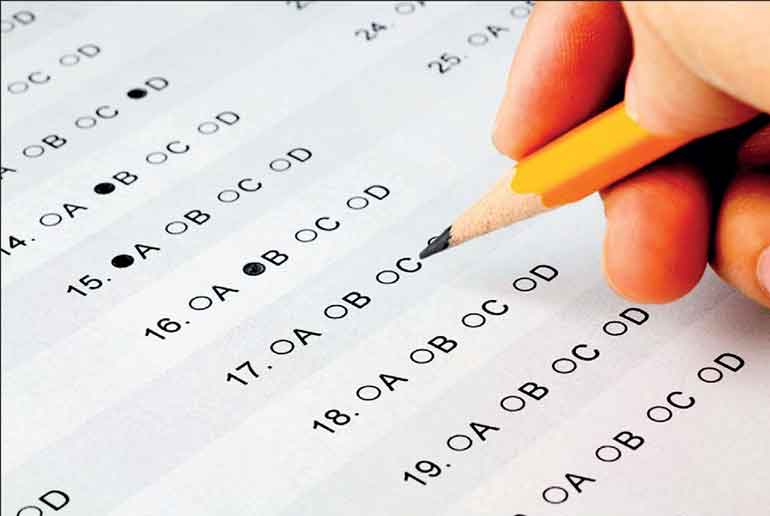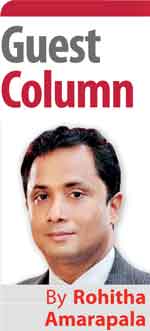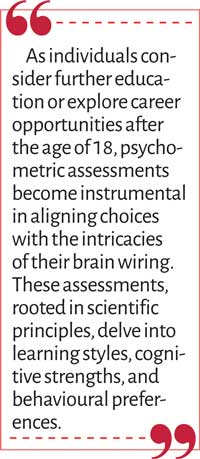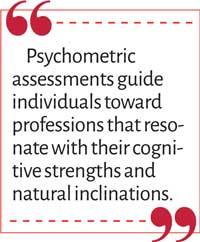Wednesday Feb 18, 2026
Wednesday Feb 18, 2026
Wednesday, 24 January 2024 00:32 - - {{hitsCtrl.values.hits}}

Psychometric assessments, when conducted by qualified practitioners, act as preventive tools by providing clarity on the best-fit educational and career paths
 In the journey toward educational and professional fulfilment, individuals often encounter pivotal decision points that shape their future trajectories. In these transformative moments, seeking the guidance of a qualified psychologist or licensed practitioner armed with psychometric assessments proves to be an invaluable compass. This article delves into the critical importance of professional assistance in comprehending personal strengths, preferences and aptitudes through psychometric assessments. It aims to highlight the role of these assessments in facilitating informed choices about educational and career paths, particularly by acknowledging the profound impact of brain development after the age of 18.
In the journey toward educational and professional fulfilment, individuals often encounter pivotal decision points that shape their future trajectories. In these transformative moments, seeking the guidance of a qualified psychologist or licensed practitioner armed with psychometric assessments proves to be an invaluable compass. This article delves into the critical importance of professional assistance in comprehending personal strengths, preferences and aptitudes through psychometric assessments. It aims to highlight the role of these assessments in facilitating informed choices about educational and career paths, particularly by acknowledging the profound impact of brain development after the age of 18.
Understanding psychometric assessment
Psychometric assessment is a sophisticated methodological approach that involves the use of standardised tests to measure and evaluate an individual’s cognitive abilities, personality traits, and aptitudes. These assessments delve into the intricacies of an individual’s mental capabilities and behavioural styles, providing a comprehensive picture that goes beyond traditional metrics like academic achievements or work experience.
Brain development beyond 18
It is essential to recognise that the brain undergoes significant development throughout adolescence and into early adulthood. By the age of 18, the prefrontal cortex, responsible for decision-making and complex thinking, is typically fully developed. This signifies a crucial juncture where individuals are better equipped to make informed choices about their education and career. Psychometric assessments, conducted by qualified professionals, leverage this neurological maturity to provide insights that are foundational in making strategic life decisions.
Author’s practical experience
The writer of this article, a seasoned Chartered HR professional with over two decades of experience, has not only recognised the theoretical significance of psychometric assessments but has hands-on experience in conducting these assessments in both local, Government and multinational organisations in the country. This practical engagement adds a layer of authenticity to the insights shared, as the author’s application of psychometric assessments is rooted in the diverse dynamics of different organisational contexts.
The author’s strong belief in the applicability of best practices, including psychometric assessments, in developing nations like Sri Lanka, is not just a theoretical standpoint. It is a conviction that has been tested and affirmed through practical experiences in the field. The author’s dedication to enhancing the efficiency of human resources in a developing context is evident in the real-world application of psychometric assessments as a tool for personalised development.
Tailoring education to brain wiring
 As individuals consider further education or explore career opportunities after the age of 18, psychometric assessments become instrumental in aligning choices with the intricacies of their brain wiring. These assessments, rooted in scientific principles, delve into learning styles, cognitive strengths, and behavioural preferences. By understanding how an individual’s brain is wired, psychologists can tailor recommendations that ensure an optimal match between education, career choices, and inherent strengths.
As individuals consider further education or explore career opportunities after the age of 18, psychometric assessments become instrumental in aligning choices with the intricacies of their brain wiring. These assessments, rooted in scientific principles, delve into learning styles, cognitive strengths, and behavioural preferences. By understanding how an individual’s brain is wired, psychologists can tailor recommendations that ensure an optimal match between education, career choices, and inherent strengths.
Career alignment through brain science
The alignment of career paths with an individual’s brain wiring is a nuanced science. Psychometric assessments guide individuals toward professions that resonate with their cognitive strengths and natural inclinations. By considering factors such as aptitudes and personality traits, these assessments offer a scientific basis for career guidance, ensuring that individuals are well-matched to professions that complement their neurological makeup.
Scientific rigour in developed countries
Psychometric assessment is a well-established and scientifically rigorous method widely practiced in developed countries. The assessments undergo meticulous development processes, statistical analyses, and continuous refinement to ensure reliability and validity. The integration of psychometric assessments into educational and professional decision-making processes is commonplace in these societies, underlining the trust placed in the scientific foundation of these tools.
Mitigating mismatch risks
Mismatched educational or career choices can lead to dissatisfaction and unfulfilled potential. Psychometric assessments, when conducted by qualified practitioners, act as preventive tools by providing clarity on the best-fit educational and career paths. By leveraging the insights gained from brain science, individuals can mitigate the risks of mismatch and embark on journeys that align seamlessly with their cognitive strengths.
Investing in informed self-discovery
Seeking the guidance of a qualified psychologist for psychometric assessments is an investment in informed self-discovery. Beyond evaluation, it is a collaborative exploration of one’s potential, guided by the understanding of how the brain is wired. The insights gained empower individuals to navigate their educational and professional journeys with confidence, maximising their strengths and contributing meaningfully to their chosen paths.
Author’s advocacy for developing nations
The author’s belief in the transformative power of psychometric assessments is not limited to the developed world but extends to developing nations like Sri Lanka. Through practical application, the author has witnessed the positive impact of psychometric assessments in enhancing the efficiency of human resources in these contexts. The advocacy for such best practices in developing nations becomes a call to action based on the author’s tangible experiences in navigating educational and professional paths.
Conclusion
 In the era of personalised education and career development, psychometric assessments guided by qualified psychologists emerge as transformative tools rooted in brain science. As individuals stand at the crossroads of their educational and professional futures, seeking professional guidance ensures that the choices made are not just informed but deeply aligned with personal strengths and aspirations. It is an investment in self-discovery, setting the stage for a fulfilling educational and professional journey. In the hands of a qualified psychologist, psychometric assessments become a beacon, leveraging brain science to guide individuals toward pathways that best fit their unique potential. The author’s practical experience in both local and multinational organisations in Sri Lanka reinforces the applicability and efficacy of psychometric assessments in diverse contexts, making the case for their widespread adoption in developing nations.
In the era of personalised education and career development, psychometric assessments guided by qualified psychologists emerge as transformative tools rooted in brain science. As individuals stand at the crossroads of their educational and professional futures, seeking professional guidance ensures that the choices made are not just informed but deeply aligned with personal strengths and aspirations. It is an investment in self-discovery, setting the stage for a fulfilling educational and professional journey. In the hands of a qualified psychologist, psychometric assessments become a beacon, leveraging brain science to guide individuals toward pathways that best fit their unique potential. The author’s practical experience in both local and multinational organisations in Sri Lanka reinforces the applicability and efficacy of psychometric assessments in diverse contexts, making the case for their widespread adoption in developing nations.
(The writer is a Chartered HR professional with an impressive track record of over two decades in navigating the complexities of both private and public sectors, as well as multinational organisations. He is a licensed practitioner of psychometric assessments accredited by Thomas International Systems and an MBA holder of University of Western Sydney, Australia. He is a past president of Chartered Institute of Personnel Management, Sri Lanka (CIPM) and the recipient of HR Lifetime Gold Medal conferred to the most outstanding HR professional in the year 2018. He is currently heading the Human Resource Management function at Sri Lanka Insurance Corporation Ltd.)